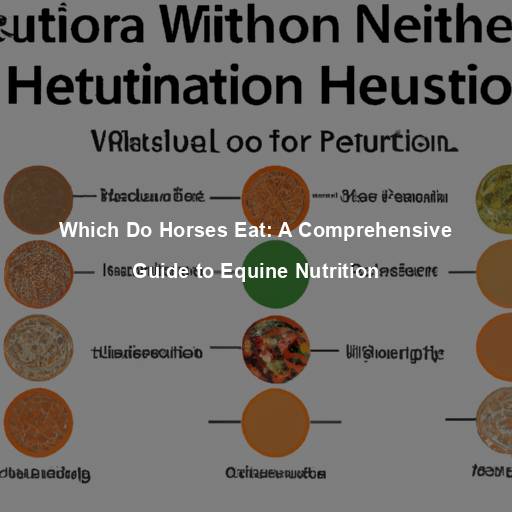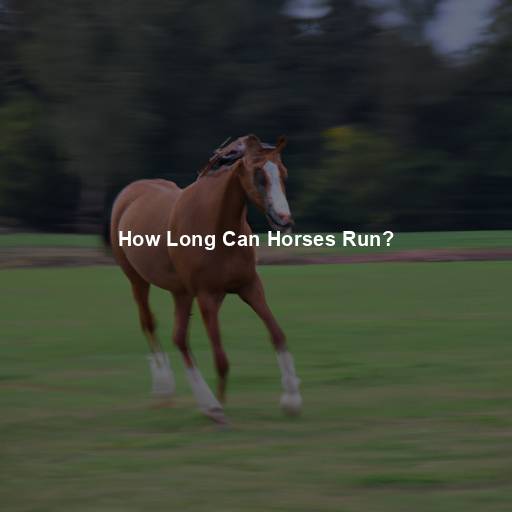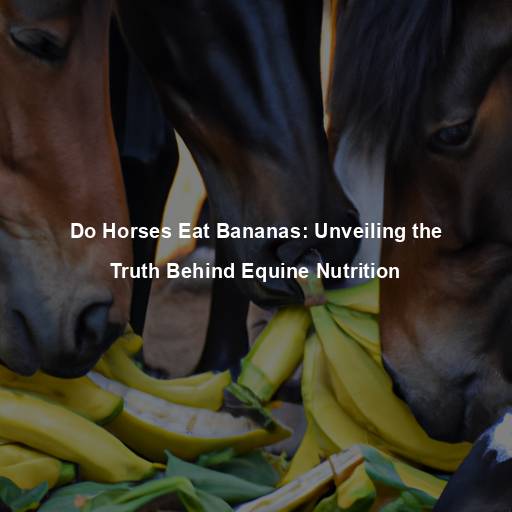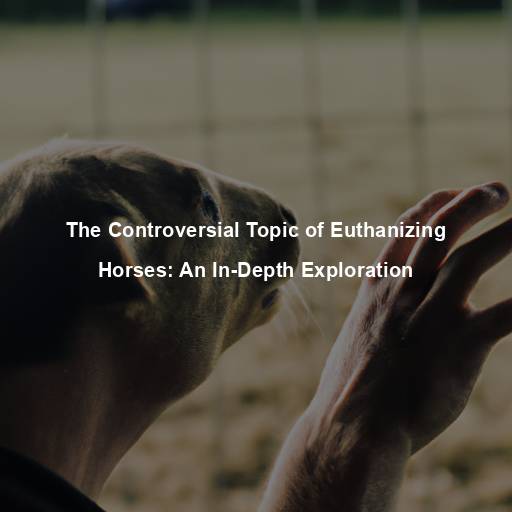Which Do Horses Eat: A Comprehensive Guide to Equine Nutrition
Last Updated on October 26, 2023 by Evan
Contents
- 1 Understanding the Dietary Needs of Horses
- 2 Key Components of a Horse’s Diet
- 3 Considerations for Feeding Horses
- 3.1 Body Condition and Weight Management
- 3.2 Age and Life Stage
- 3.3 Exercise and Workload
- 3.4 Health Conditions and Special Considerations
- 3.5 Macronutrients: Proteins, Carbohydrates, and Fats
- 3.6 Micronutrients: Vitamins and Minerals
- 3.7 Feeding Practices and Considerations
- 3.8 Consulting with Professionals
- 3.9 Managing Weight and Obesity
- 3.10 Feeding Senior Horses
- 3.11 Special Dietary Needs for Performance Horses
- 4 FAQs: Which do horses eat?
- 4.1 What is the typical diet of horses?
- 4.2 Can horses eat fruits and vegetables?
- 4.3 Do horses require any additional supplements?
- 4.4 Are grains a part of a horse’s diet?
- 4.5 How often should horses be fed?
- 4.6 Can horses eat grass clippings or lawn trimmings?
- 4.7 What should horses not eat?
- 4.8 Can horses eat haylage or silage?
Understanding the Dietary Needs of Horses
Horses, magnificent creatures known for their strength and beauty, have specific dietary needs to maintain their health and vitality. As responsible horse owners, it is our duty to provide them with a well-balanced and nutritious diet. In this guide, we will delve into the world of equine nutrition, exploring the various components of a horse’s diet and understanding what they eat.
The Natural Diet of Horses
To understand a horse’s dietary requirements, it is important to consider their natural feeding habits. In the wild, horses are grazing animals, spending a significant amount of time foraging for food. Their digestive systems are designed to process a high-fiber diet, primarily consisting of grasses and other vegetation.
The Role of Forage in a Horse’s Diet
When it comes to nourishing our equine companions, there’s no denying the crucial role that forage plays. Whether it be luscious pasture grass or nutrient-rich hay, this natural sustenance acts as the very backbone of a horse’s diet, offering a tantalizing medley of carbohydrates, proteins, vitamins, and minerals. Not only does forage contribute to their overall well-being, but it also ensures the smooth functioning of their digestive system, effectively warding off the dreaded foes of colic and ulcers.
Understanding the Importance of Fiber
A horse’s digestive well-being rests on the delicate balance of fiber in their diet. This humble nutrient works wonders by nurturing a thriving gut ecosystem and promoting efficient digestion. To keep our equine companions in tiptop shape, they need to munch on a daily dose of forage equivalent to 1-2% of their body weight. By doing so, we safeguard their digestive system from potential ailments and maintain their overall health.
Key Components of a Horse’s Diet
Pasture Grass
Did you know that pasture grass is like a gourmet buffet for horses? Each mouthful offers a burst of different grass species, each with its own unique blend of nutrients. Depending on where you live, your horse’s grazing experience could be a culinary adventure! However, it’s important to keep an eye on the quality of the buffet – overgrazing and unwanted plants can turn this feast into a perplexing puzzle.
Hay
Hay is a vital component of a horse’s diet, especially when pasture grass is limited or during winter months. It provides a source of long-stem fiber, mimicking the natural grazing behavior of horses. Good quality hay should be free from dust, mold, and harmful weeds. Common types of hay include Timothy, Orchard grass, and Bermuda grass.
Concentrates
When it comes to fueling our equine companions, concentrates like grains and commercial horse feeds have long been a go-to supplement. Crafted with precision, they pack a punch of energy, protein, vitamins, and minerals. But hold your horses! We must approach concentrates with caution, as they should be administered sparingly and with customization to suit the unique needs of every horse.
Water
Water is an absolute necessity for horses, playing a pivotal role in their overall well-being. It is imperative to ensure that these majestic creatures have access to an unending source of pristine, untainted water, one that is not only refreshing but also instrumental in facilitating numerous bodily processes. The amount of water that a horse imbibes on a daily basis varies significantly, ranging between an astonishing 5 to 10 gallons, contingent upon a host of factors such as their stature, level of exertion, and the prevailing climate.
Considerations for Feeding Horses
Body Condition and Weight Management
Maintaining a healthy body condition is essential for a horse’s overall well-being. Regularly monitor your horse’s weight and adjust their diet accordingly. Overfeeding can lead to obesity, while underfeeding can result in malnutrition and poor performance. Consult with a veterinarian or equine nutritionist to develop a feeding plan that suits your horse’s specific needs.
Age and Life Stage
Navigating the intricacies of equine nutrition can be an enigmatic puzzle, particularly when considering the diverse dietary needs of horses throughout their lifespan. From the sprightly foals to the wise old souls, each stage demands a distinctive approach to sustenance. Safeguarding optimal nourishment becomes paramount to fostering robust growth and sound development in these majestic creatures.
Exercise and Workload
The level of exercise and workload your horse undergoes also affects their dietary needs. Horses in intense training or competition may require additional calories and nutrients to support their energy expenditure. Adjust their diet accordingly and consider consulting a professional to optimize their performance.
Health Conditions and Special Considerations
Horses, just like us, can have their own health quirks and dietary complexities. Take, for instance, those majestic creatures with metabolic conditions such as equine metabolic syndrome or insulin resistance; they demand a careful balance of low-sugar and low-starch sustenance. To unravel the enigma of equine dietary needs, it’s imperative to seek the sage counsel of a veterinary expert or an equine nutritionist who can unravel the intricate threads of their unique dietary tapestry.
Macronutrients: Proteins, Carbohydrates, and Fats
Providing horses with adequate protein is crucial for their overall well-being, as it supports tissue growth and regeneration. Optimal sources of this vital nutrient can be found in legumes like alfalfa or clover, as well as certain grains. However, it’s essential to strike a delicate balance, as an excessive intake of protein can have adverse health effects on our equine friends. To ensure their nutritional needs are met, a holistic approach must be taken, integrating various nutrients in their diet.
When it comes to giving horses the energy they need, carbohydrates take the reins. From the lush forage to the grains and concentrates they devour, these trusty fuel sources make their way to the small intestine, where some magical digestion happens. It’s here that carbohydrates transform into glucose, a powerhouse of fuel for these majestic creatures. But hold your (horse)power – too much carbs, especially the sneaky starches and sugars, can lead to some rather unpleasant digestive woes like colic or laminitis.
When it comes to fueling our equine companions, fats step up to the plate as a powerhouse source of energy. Packed with concentrated calories, they lend a helping hoof to horses in need of an extra boost, whether they are high-performing athletes or those with a fast-paced metabolism. When exploring the realm of dietary fats, look no further than the likes of vegetable oils and select seeds for your equine partner’s winning recipe.
Micronutrients: Vitamins and Minerals
Vitamins and minerals play a vital role in various physiological functions within a horse’s body. Some essential vitamins for horses include vitamin A, vitamin E, and the B-complex vitamins. These vitamins are involved in processes like immune function, bone health, and energy metabolism.
When it comes to the health of our equine companions, minerals play a vital role in ensuring their well-being. Think of minerals like calcium, phosphorus, magnesium, and potassium as the unsung heroes that keep our horses moving, thinking, and just overall functioning. To make matters more complex, horses obtain these essential minerals from their diet, mainly through forage and concentrates. However, ensuring that the mineral ratios are in perfect harmony becomes a perplexing task, as any imbalances can potentially lead to a host of health issues.
Feeding Practices and Considerations
When it comes to feeding horses, there are a few best practices and considerations to keep in mind:
Feed Quality
Ensure that the feed you provide to your horses is of high quality. This includes choosing fresh and mold-free hay, ensuring pasture grass is free from harmful plants, and selecting concentrates that are free from contaminants. Proper storage and handling of feed are also important to maintain its nutritional value.
Feeding Frequency
Horses are naturally designed to graze throughout the day, so it is ideal to provide them with frequent small meals rather than a few large ones. This helps mimic their natural feeding behavior and aids in proper digestion. If possible, divide their daily ration into multiple feedings.
Slow Feeding and Forage Alternatives
When it comes to our equine companions, there’s no denying that some of them have a propensity for devouring their meals at warp speed. Unfortunately, this has the potential to cause some serious tummy troubles. Luckily, there are a few nifty solutions on the market that can help mitigate this issue. Slow feeder hay nets and alternative forage options like hay cubes or soaked beet pulp are effective ways to put the brakes on their speedy munching and ensure their digestion is in tip-top shape.
Supplements
When it comes to our equine companions, it’s no secret that their nutritional needs can be a bit of a puzzle. Sometimes, our trusty steeds require a little extra help in the form of supplements to keep them in tip-top shape. Whether it’s a boost of vitamins, minerals, or specialized goodies for their joints or coat, it’s always best to seek advice from a knowledgeable professional – like a veterinarian or equine nutritionist – to ensure that these additions are truly necessary and suitable for our four-legged friends. So, saddle up and make sure to give your horse the best care possible!
Monitoring and Adjusting
Regularly monitor your horse’s body condition, weight, and overall health. This will help you identify any changes in their nutritional needs and make adjustments accordingly. If you notice any abnormalities or concerns, seek guidance from a professional to address them promptly.
Consulting with Professionals
Proper equine nutrition is a complex subject, and it is always advisable to consult with professionals in the field. Veterinarians, equine nutritionists, or experienced horse trainers can provide valuable guidance based on your horse’s individual needs and circumstances. They can assess your horse’s diet, recommend specific feed options or supplements, and help you develop a well-balanced feeding plan.
Managing Weight and Obesity
When it comes to the weight management of our equine companions, it’s important to recognize that horses, just like us, can face their fair share of challenges. Striving for optimal body condition becomes paramount, as it directly impacts their overall health and lifespan. Luckily, if you find yourself in a situation where your horse is carrying a few extra pounds, there are plenty of approaches you can undertake to navigate this perplexing issue.
Adjusting Caloric Intake
When it comes to helping your beloved horse shed those extra pounds, it’s all about managing their calorie intake. One effective approach is to cut back on calorie-rich concentrates and grains while ramping up their exercise routine. To ensure a well-rounded and controlled feeding plan, seeking guidance from a trusted vet or equine nutritionist is a wise move. Embrace this new journey of weight loss for your horse, and watch their transformation unfold!
Controlled Grazing
Is your beloved horse indulging a bit too much in the green goodness of the pasture? Fear not! Introducing the miraculous grazing muzzle – a nifty device that magically restricts their calorie intake while still granting them the joy of frolicking in the great outdoors. But it doesn’t stop there!
Regular Exercise
Keeping horses at a healthy weight requires more than just wishful thinking – it demands a commitment to regular exercise. A well-rounded routine, comprising groundwork, riding, and various physical activities, is key to achieving optimal weight management. By gradually intensifying the duration and intensity of their exercise regimen, horse owners can ensure their equine companions experience safe and effective weight loss. Remember, consistency is the name of the game when it comes to keeping those pounds at bay!
Feeding Senior Horses
As our equine companions gracefully advance in years, it is imperative to recognize the shifting landscape of their dietary requirements. These noble seniors confront a trifecta of obstacles, including dental quandaries, dwindling digestive prowess, and the delicate task of sustaining an optimal physique. When nourishing our wise four-legged friends, it is paramount to delve into the following considerations:
Dental Care
Taking care of your senior horse’s dental health is of utmost importance to ensure their overall well-being. Keeping up with regular dental check-ups and smoothing sharp teeth are vital to prevent any potential issues that may arise. Dental problems can have a significant impact on their ability to chew and digest food adequately. If needed, it is recommended to make adjustments to their diet by providing options such as soaked or pelleted feeds that are easier for them to chew and digest, reducing any discomfort or perplexity they may experience.
Increased Fiber and Nutrient Density
Senior horses may require increased fiber in their diet to support digestive health. Good-quality forage or alternative fiber sources, such as beet pulp or hay cubes, can be added to their diet. Additionally, choosing senior-specific feeds that are formulated with higher nutrient density can help meet their nutritional requirements.
Joint Support
As our beloved horses gracefully mature, the afflictions of aging start to emerge, including the nagging issue of joint health. Fortunately, there are joint supplements available in the market that boast ingredients like glucosamine or chondroitin sulfate, which can work wonders in bolstering joint function and ensuring unhindered mobility. However, it is crucial to seek the wise counsel of a veterinarian who can guide you through the maze of supplement options and help determine the precise concoction suitable for your wise, old equine companion.
Special Dietary Needs for Performance Horses
Horses involved in intense training, competition, or working at high levels of performance have specific nutritional requirements. Providing them with the necessary nutrients will aid in maintaining their energy levels, supporting muscle function, and promoting overall performance. Consider the following:
Increased Caloric Intake
When it comes to high-achieving equine athletes, their voracious appetites can leave you puzzled. To sustain their competitive prowess, adding some oomph to their meal plans becomes essential. Whether through a heartier helping of concentrated feeds or introducing supplements packed with calorie firepower, the key is to navigate the nutritional maze wisely. Striking a harmony between calorie boosters and maintaining a balanced diet is the secret sauce for these performance horses to shine.
Electrolyte Supplementation
During intense exercise or hot weather, horses can lose significant amounts of electrolytes through sweat. Supplementing with electrolytes can help replenish these essential minerals and maintain proper hydration and muscle function. Follow the recommended dosage and consult with a veterinarian or equine nutritionist for guidance.
Recovery and Muscle Support
When it comes to recovering from those grueling workouts or epic competitions, the importance of post-exercise nutrition cannot be overstated. Seek out feeds or supplements that pack a punch of amino acids like lysine and methionine. These little powerhouses are the fuel your muscles need to rebuild and grow stronger. And don’t forget about antioxidants!
FAQs: Which do horses eat?
What is the typical diet of horses?
Horses are herbivores, which means their diet mainly consists of plant material. The typical diet of horses consists of grass and hay. They are grazing animals, so they need access to good quality pasture or hay throughout the day.
Can horses eat fruits and vegetables?
Yes, horses can eat certain fruits and vegetables. However, not all fruits and vegetables are suitable for them. Apples and carrots are commonly fed to horses as treats and can be included in their diet in moderation. It is important to avoid feeding them any fruits or vegetables that are toxic to horses, such as avocados, tomatoes, potatoes, or onions.
Do horses require any additional supplements?
In general, if a horse has access to good quality pasture or hay, they receive most of the nutrients they need. However, some horses may require additional supplements to their diet. These supplements can include minerals, vitamins, or specialized feeds, and are usually recommended and prescribed by a veterinarian or equine nutritionist based on the specific needs of the horse.
Are grains a part of a horse’s diet?
When it comes to horses, the dietary choices can be quite the brain teaser. While oats, barley, corn, and wheat can be on the menu, it’s crucial to stir in a little moderation. The grain debate boils down to various horse-specific factors like activity level, age, and health. It’s wise to harness the expertise of a veterinarian to navigate this nutritional maze, ensuring a tailored and balanced diet gallops alongside your equine companion.
How often should horses be fed?
When it comes to feeding our equine friends, it can often be a perplexing task. However, research has shown that opting for multiple small meals rather than large ones can be highly beneficial. By mimicking their natural grazing behavior and ensuring they have access to forage throughout the day, we can alleviate the burstiness of their digestion process. So, let’s embrace this feeding strategy to keep our horses happy and their tummies content!
Can horses eat grass clippings or lawn trimmings?
As equestrians, we often find ourselves pondering over the ideal diet for our majestic companions. However, when it comes to feeding horses, one perplexing question arises – should we offer them grass clippings or lawn trimmings? Bursting with an array of contrasting opinions, this subject has sparked controversy within the equine community. On one hand, freshly cut grass, packed with its vibrant green allure, swiftly undergoes a transformation into a fermenting and molding delicacy, which may induce digestive distress and even potential colic. Additionally, the plot thickens with the presence of toxic substances such as herbicides or pesticides, concealed deep within the textures of grass clippings, posing a potential threat to our four-legged companions. Thus, steering clear of clippings seems the wisest course of action, opting instead to provide our equine friends with fresh pasture or high-quality hay to nourish their splendid beings. After all, being a responsible caretaker sometimes calls for making perplexing decisions with the well-being of our horses at the forefront of our minds.
What should horses not eat?
When it comes to our equine friends, it’s essential to tread cautiously in the culinary realm. Believe it or not, there are some dietary hazards that can send our majestic horses galloping towards perplexing health issues. To ensure their well-being, it’s vital to steer them away from certain treats like chocolate, caffeine, alcohol, tomatoes, onions, potatoes, rhubarb, avocados, and any sneaky substances laced with artificial sweeteners like xylitol. Brittle boundaries in the equine menu demand our attentiveness, urging us to consult a trusted veterinarian when it comes to uncharted culinary territories.
Can horses eat haylage or silage?
Horse owners often seek alternatives to traditional hay, and haylage and silage are viable options. Yet, the perplexing aspect lies in the vast disparity in quality and nutritional value among these substitutes. Prioritizing high-quality and mold-free haylage or silage becomes an undeniably crucial undertaking when considering their incorporation into equine diets. To alleviate this perplexity, consulting an equine nutritionist emerges as the apt solution to decipher the intricacies of feeding horses with these alternatives.






